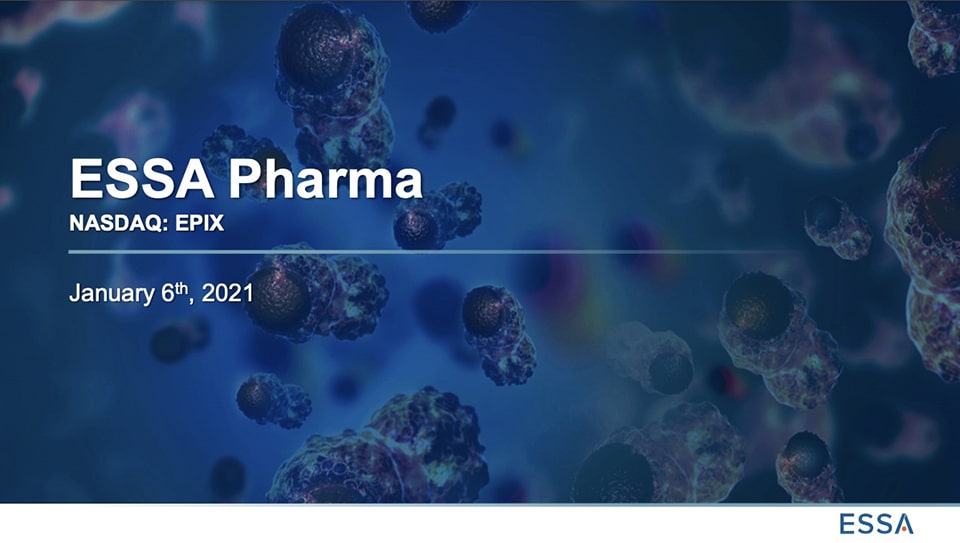
EPI-7386 was safe and well-tolerated at all dose levels and schedules tested with plasma target concentrations achieved and clinically important efficacy signals
Conference Call and Webcast Today at 5:00 p.m. ET
SOUTH SAN FRANCISCO, California and VANCOUVER, Canada, June 27, 2022 /CNW/ - ESSA Pharma Inc. ("ESSA", or the "Company") (NASDAQ: EPIX), a clinical-stage pharmaceutical company focused on developing novel therapies for the treatment of prostate cancer, today presented clinical results from the Phase 1a dose escalation study of EPI-7386, ESSA's first-in-class N-terminal domain ("NTD") androgen receptor ("AR") inhibitor, as a monotherapy for the treatment of patients with metastatic castration-resistant prostate cancer ("mCRPC") resistant to current standard-of-care therapies. The initial data from 36 patients demonstrate that EPI-7386 was well-tolerated, exhibited a favorable pharmacokinetic profile, and demonstrated initial anti-tumor activity in a heavily pretreated group of patients. ESSA expects to initiate the Phase 1b expansion study in Q3 2022.
"We are pleased with the progress in advancing our novel prostate cancer candidate EPI-7386 as a monotherapy in patients with advanced mCRPC. EPI-7386's favorable safety and tolerability profile, good pharmaceutical characteristics together with both antiandrogen biological and anti-tumor activity support our decision to move into earlier lines of therapy and, importantly, study EPI-7386 in combination with second-generation antiandrogens," said Dr. David R. Parkinson, President and Chief Executive Officer of ESSA Pharma Inc. "Further, ctDNA molecular analysis in this heavily pretreated population has given us a detailed profile of genetic alterations, revealing the biological complexity of late-stage mCRPC patients but also allowing us to continue to refine the population of prostate cancer patients whose tumors are still primarily driven by the androgen receptor and therefore most likely to respond to an androgen receptor inhibitor."
In the multi-center, open-label Phase 1a dose escalation study, 31 patients received EPI-7386 as oral tablets once a day (QD) in cohorts with 200 milligram increments from 200 milligrams up to 1000 milligrams. Patients in this QD group were heavily pretreated, with a median of seven lines of prior therapy for prostate cancer and four lines of therapy for metastatic mCRPC. Almost 60% of patients had been treated with prior chemotherapy. Patients entered the trial with rapidly progressive disease, as evidenced by a median prostate-specific antigen ("PSA") doubling time of only 2.1 months and a median ctDNA percent of 29%. Almost a third of the patients had lung, liver, or brain metastases, and an overlapping third of patients had overt neuroendocrine differentiation. The ctDNA analysis revealed that tumors in these patients had extensive non-AR associated genomic changes denoting the presence of multiple non-AR oncogenic drivers associated with late-stage prostate cancer. Following a protocol amendment, five patients were enrolled in a twice-daily (BID) dose regimen in 400 mg and 600 mg BID cohorts. The amendment excluded patients who had been treated with more than three prior lines of therapy, excluded patients with visceral metastases, and permitted only one prior line of chemotherapy.
Key safety results from both QD and BID patients as of June 1, 2022:
- EPI-7386 was safe and well-tolerated at all dose levels and schedules tested, with no dose-limiting toxicities.
- Treatment related adverse events were limited to Grade 1 or Grade 2, with one Grade 3 occurrence of anemia ultimately deemed unlikely to be treatment related.
- There was no apparent dose dependency in any of the side effects.
Antiandrogen response was assessed by changes in circulating PSA levels, changes in ctDNA levels, and radiographic changes in disease burden measured by both traditional RECIST criteria as well as by total lesion volumetric quantification using the AIQ Solutions platform.
Key response findings in both QD and BID patients as of June 1, 2022:
- In five patients who had measurable disease and were on therapy for more than 12 weeks, tumor volume decreased in all five patients.
- PSA decreases or PSA stabilization was observed in a clinical subset of patients with no visceral disease, fewer DNA genomic aberrations in non-AR oncogenic pathways, and fewer than 3 lines of therapy, providing further information to refine the monotherapy development program patient population.
- In 17 patients with measurable ctDNA levels at baseline, ctDNA declines were observed in patients harboring AR point mutations, AR gain/amplification and AR truncations, suggesting EPI-7386's potential activity against these tumors.
The Company expects to initiate the Phase 1b monotherapy expansion study in Q3 2022 and will plan to enroll two dose cohorts into this study following recent guidance from the FDA from Project Optimus. The study will evaluate a patient population of mCRPC similar to the one treated under the BID dose regimen but with the additional exclusion of prior chemotherapy. Up to 12 patients per each dose/schedule (600 mg QD and either 400 mg or 600 mg BID) will be evaluated to gain additional information about safety, tolerability, exposure and anti-tumor activity of EPI-7386 in a less heavily pretreated patient population. In addition, a separate cohort of patients with non-metastatic CRPC will be enrolled into a 12-week Window of Opportunity study with a clinical endpoint (i.e. PSA changes) to assess the anti-tumor activity of EPI-7386 in a patient population in which the disease is mainly AR-driven and the tumor biology has not been affected by second-generation antiandrogen therapy. Lastly, we anticipate initiating later this year a Phase 2 investigator-sponsored neoadjuvant study which will evaluate darolutamide compared to EPI-7386 + darolutamide in patients undergoing prostatectomy for high-risk localized prostate cancer.
In addition to these studies, EPI-7386 is under evaluation in earlier lines of therapy in Phase 1/2 trials combining EPI-7386 with approved second-generation antiandrogens. The Company has completed dosing of the first cohort of patients past the 28-Day dose-limiting toxicity period with no safety issues and is currently enrolling the second cohort of patients into the Phase 1/2 study of EPI-7386 in combination with Astellas Pharma Inc.'s and Pfizer Inc.'s AR inhibitor, enzalutamide, in patients with mCRPC who have not been treated with second-generation antiandrogens.
"We continue to be excited by our combination trials evaluating EPI-7386 with the four leading, commercially available antiandrogens in earlier line patient populations," said Dr. Parkinson. "Preliminary data from the first cohort in the Phase 1/2 combination trial with enzalutamide suggests that the drugs can be combined safely and result in drug levels of both drugs which are predicted to be active based upon clinical and preclinical data. The early data, in addition to preclinical studies, support EPI-7386's potential in combination with second-generation antiandrogens to suppress androgen receptor biology and induce a potent anti-tumor response."
Webcast and Conference Call
Management will host a conference call and live audio webcast to discuss the clinical updates at 5:00 p.m. ET today. To participate in the conference call, please dial 1-877-405-1224 (domestic) or 1-201-389-0848 (international). The live webcast can be accessed in the Events & Presentations section of the Company's website at www.investors.essapharma.com. The archived webcast will be available for replay following the event.
About EPI-7386
EPI-7386 is an investigational, highly-selective, oral, small molecule inhibitor of the N-terminal domain of the androgen receptor. EPI-7386 is currently being studied in a Phase 1 clinical trial (NCT04421222) in men with mCRPC whose tumors have progressed on current standard-of-care therapies. The Phase I clinical trial of EPI-7386 began in calendar Q3 of 2020 following FDA allowance of the Investigational New Drug application and Health Canada acceptance. The U.S. FDA has granted Fast Track designation to EPI-7386 for the treatment of adult male patients with mCRPC resistant to standard-of-care treatment. ESSA is also conducting a Phase 1/2 study to evaluate the safety, tolerability and preliminary efficacy of the combination of EPI-7386 and the antiandrogen enzalutamide in mCRPC patients who have not yet been treated with second-generation antiandrogen therapies. ESSA retains all rights to EPI-7386 worldwide.
About ESSA Pharma Inc.
ESSA is a clinical-stage pharmaceutical company focused on developing novel and proprietary therapies for the treatment of patients with prostate cancer. For more information, please visit www.essapharma.com and follow us on Twitter under @ESSAPharma.
About Prostate Cancer
Prostate cancer is the second-most commonly diagnosed cancer among men and the fifth most common cause of male cancer death worldwide (Globocan, 2018). Adenocarcinoma of the prostate is dependent on androgen for tumor progression and depleting or blocking androgen action has been a mainstay of hormonal treatment for over six decades. Although tumors are often initially sensitive to medical or surgical therapies that decrease levels of testosterone, disease progression despite castrate levels of testosterone can lead to mCRPC. The treatment of mCRPC patients has evolved rapidly over the past ten years. Despite these advances, many patients with mCRPC fail or develop resistance to existing treatments, leading to continued disease progression and limited survival rates.
Forward-Looking Statement Disclaimer
This release contains certain information which, as presented, constitutes "forward-looking information" within the meaning of the Private Securities Litigation Reform Act of 1995 and/or applicable Canadian securities laws. Forward-looking information involves statements that relate to future events and often addresses expected future business and financial performance, containing words such as "anticipate", "believe", "plan", "estimate", "expect", and "intend", statements that an action or event "may", "might", "could", "should", or "will" be taken or occur, or other similar expressions and includes, but is not limited to, statements regarding: the results of the initial clinical data, including the favorable pharmaceutical properties of EPI-7386; the commencement and timing of a Phase 1b expansion study and other milestones; the design and success of EPI-7386's Phase 1a/1b monotherapy study and questions addressed thereby; the design and timing of Window-of-Opportunity and Investigator-Sponsored neoadjuvant studies; the possibility of greater AR suppression from EPI-7386's combination with antiandrogen therapies; planned studies under the EPI-7386 Combination Development Program; EPI-7386's drug-drug interactions and safety in combination with other therapies; and other statements surrounding the Company's clinical evaluation of EPI-7386.
Forward-looking statements and information are subject to various known and unknown risks and uncertainties, many of which are beyond the ability of ESSA to control or predict, and which may cause ESSA's actual results, performance or achievements to be materially different from those expressed or implied thereby. Such statements reflect ESSA's current views with respect to future events, are subject to risks and uncertainties and are necessarily based upon a number of estimates and assumptions that, while considered reasonable by ESSA as of the date of such statements, are inherently subject to significant medical, scientific, business, economic, competitive, political and social uncertainties and contingencies. In making forward looking statements, ESSA may make various material assumptions, including but not limited to (i) the accuracy of ESSA's financial projections; (ii) obtaining positive results of clinical trials; (iii) securing partner participation in combination clinical trials; (iv) obtaining necessary regulatory approvals; and (v) general business, market and economic conditions.
Forward-looking information is developed based on assumptions about such risks, uncertainties and other factors set out herein and in ESSA's Annual Report on Form 10-K dated November 18, 2021 under the heading "Risk Factors", a copy of which is available on ESSA's profile on EDGAR at www.sec.gov, and as otherwise disclosed from time to time on ESSA's SEDAR profile www.sedar.com.Forward-looking statements are made based on management's beliefs, estimates and opinions on the date that statements are made and ESSA undertakes no obligation to update forward-looking statements if these beliefs, estimates and opinions or other circumstances should change, except as may be required by applicable Canadian and United States securities laws. Readers are cautioned against attributing undue certainty to forward-looking statements.
SOURCE ESSA Pharma Inc

